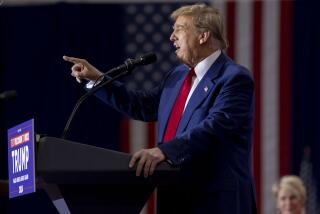Appellate judge asks Supreme Court to clarify privacy rights
- Share via
Is there a constitutional right to informational privacy?
That is a question that Chief Judge Alex Kozinski of the U.S. 9th Circuit Court of Appeals is asking the U.S. Supreme Court, saying that the justices hinted at such a right 32 years ago and “never said another word about it.”
Kozinski urged the high court Thursday to clarify what, if any, right a citizen has to shield medical and mental health records from an employer’s inspection. The issue arises from the successful challenge by workers at Jet Propulsion Laboratory, Caltech and other federal aerospace contractors to the Bush administration’s demand for probing security reviews after the Sept. 11, 2001, terror attacks.
A majority of the appeals court’s 27 active judges voted against convening an 11-judge panel to reconsider Nelson vs. NASA, the case brought on behalf of more than 4,000 JPL employees.
Senior research scientist Robert M. Nelson and 27 other JPL specialists sued NASA in 2007 to thwart the government’s demands for access to their financial, medical and psychiatric records in exchange for letting them keep their jobs. The personal information was sought as part of a badge-issuing program ordered by the Department of Homeland Security in 2004.
A federal district judge initially dismissed the employees’ suit, but a three-judge panel of the 9th Circuit endorsed their claim to privacy in a January 2008 ruling.
On Thursday, the appeals court rejected petitions for another three-judge review and for the fuller en banc rehearing.
That prompted Kozinski to write a dissenting opinion, arguing that with only an “opaque fragment” of an opinion from a 1977 case before the Supreme Court and a “grab bag” of interpretations since then, a fuller version of his appeals court needed to consider the JPL case to determine the details of the supposed right to privacy.
“It’s a bit like building a dinosaur from a jawbone or a skull fragment, and the result looks more like a turducken,” Kozinski said, alluding to a deboned turkey stuffed with duck and chicken. The chief judge was joined by two other Republican appointees to the court, Judges Andrew J. Kleinfeld and Carlos T. Bea.
En banc votes among the court’s active judges are secret, but Judge Kim McLane Wardlaw observed in her opinion for the majority that Thursday’s balloting wasn’t close.
Kozinski’s dissent highlighted a legal technique increasingly used by the court’s Republican appointees: When outvoted, call on the reliably conservative justices in Washington to reverse the 9th Circuit decision.
“It’s time to clear the brush,” Kozinski concluded. “An en banc court is the only practical way we have to do it. We didn’t undertake that chore today, but we’ll have to sooner or later, unless the Supreme Court should intervene.”
The high court this session has reversed all 11 cases reviewed from the 9th Circuit.
--







